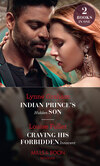Читать книгу: «Unwrapping The Innocent's Secret / Bound By Their Nine-Month Scandal», страница 5
But when he looked behind her to the cottage, with smoke coming out of the chimney and windows lit against the brooding afternoon, she stiffened.
“I’m not going to invite you inside,” she snapped at him. “You don’t get to meet him on your schedule. I thought I made that clear.”
“And this is what you want for him?” Pascal waved a hand at the fields, the clouds. “A pretty view? A limitless sky, but no real options? What can he do here besides farm the land or work as staff in the abbey?”
“As he’s five, we have yet to engage in any hard-hitting conversations about his employment prospects.” Her voice was cool. And insulting. “He’s more into trucks.”
He considered her, and his near-overwhelming urge to get his hands on her. And not because he was angry. That was only a small part of it.
“Thank you,” he said in a low voice. “That is the first bit of information about my son that you have bothered to give me. Trucks.”
She had the grace to flinch at that. And then look away. “People live perfectly happy lives here, as hard as that appears to be for you to understand.”
“Maybe so. But why would you deny him the world on the off chance that he will be one of those people?”
“I understand that the simple life doesn’t appeal to you,” she threw at him, the cold wind tossing her hair about her. She shoved it back and held it off her forehead as she glared at him. “But that speaks more to your snobbery than any lack in it.”
Pascal studied her, as she stood there, hair in a mess and clearly cold, with her body between him and her cottage.
As if she could fend him off if he wanted to walk in that door and handle this his way. Right now.
The urge to do exactly that was like a physical pain inside him.
He had dreamed of his little boy’s face. He had imagined it.
He supposed this was longing, this rough-edged ache that pulsed in him and left him feeling empty.
Behind her the cottage looked warm and cozy. He could see the buttery light from within, and even though it was winter, he could see the remains of summer flowers and the planting that must take place in spring. As if this was a house well loved. It looked happy.
Pascal couldn’t bear to think about how easily he could have gone home after his date in Rome, slept, then resumed his life. He might never have come here again. He might never have known.
And he didn’t know what to call the thing that moved in him then, all teeth and claws and what-ifs.
Cecilia stood there before him, her cheeks flushed from the chill and her arms folded across her chest as if to ward off the plummeting temperatures. As if he was the enemy when she was the one who had done this. She was the one who had hidden away here with this secret she’d had no intention of sharing with him.
“I told you I was staying here,” he growled at her. “Did you think I would change my mind?”
“Maybe I hoped you would,” she replied.
With a bitter flash of honesty that he could have done without.
It was not until he had taken his leave of her—to stomp his spleen into the frozen fields as he tramped around the valley—that he understood why he couldn’t quite bring himself to view her as evil. The way he thought he should. On the contrary, something about the way she’d stood up to him—bodily—made his chest ache, and it wasn’t until he was back in his stark, monastic chamber that he understood why.
He would have given anything, or everything if asked, to see his mother stand up for him. Even once.
But Marissa Del Guardia had stood for nothing. Not for herself, and certainly not for the child she’d never wanted who had ruined her happiness—something she had no qualm telling him directly. His father had swept in and swept her off her feet as if she was a flower to pick from a garden instead of a waitress in a restaurant he frequented. He’d used her as he liked, then discarded her when she’d fallen pregnant. He had never looked back.
And Marissa’s response had been desolation, followed by sleeping pills, and whatever she could find to take the edge off during the day.
Pascal couldn’t imagine any circumstance in which she would ever have stirred herself to defend him. He was only surprised she’d actually carried him to term.
He couldn’t deny that there was a part of him that liked the fact that his child’s mother was prepared to fight off any adversary. Even if that adversary was him.
But by the time a week had dragged by with him marooned in an empty room with only his memories for company and work to dull that noise, Pascal was beginning to lose his famous cool.
It had been educational, to say the least, to discover how much of his business he could handle from afar. It suggested that it wouldn’t do him any harm to relax his grip as he had not done since he started. He would need to consider what that meant.
But there was only so much “rusticating” a man could take in the presence of nuns who treated him like an naughty boy, the long shadow of what he’d done here and how he’d left, and the woman who appeared to think she could wait him out and, in effect, steal his child from him all over again.
Pascal wasn’t here to address his workaholic tendencies. He was here for his son.
And he’d been ignored as long as he was prepared to take.
So it was almost lowering, really, when he stormed from his room out into the clinic’s lobby to find Cecilia waiting for him.
She stood wrapped in a long, camel-colored coat that made her hair gleam and her violet eyes seem fairly purple. She stared at him for a long, solemn moment as if working up to what she meant to say.
“I’ve been here a week,” Pascal pointed out, caring not at all if every person in the clinic beyond was watching and could hear him. “I have sat in my cell and performed my penance. What more can you possibly want from me?”
“That’s a dangerous question.”
“Shall I beg?” he asked, his voice soft with the menace building in him. They were alone in the foyer for the moment, though he wouldn’t have cared if the entire order was lined up around them, singing hymns of praise. “Plead? Or perhaps I should argue my case with a kiss, which seems to be the only time you forget to view me as your enemy? Tell me, which will work? I want to see my son.”
He could see her pulse in the hollow of her elegant neck, but it didn’t appease him. He didn’t care if she was in the grip of the same emotions that buffeted him.
“No such displays are necessary,” she said, and this time, he did not attribute the sudden flush in her cheeks to the cold air outside. “I will let you see him.”
“You are too kind, Cecilia. Truly.”
“That snide tone of voice won’t do you any favors,” she retorted, her eyes flashing. “I don’t have to let you see him at all. And don’t get your hopes up. I’m not introducing you to him. Not yet. But as you say, you’ve been here a week. I expected you to be gone before morning, again. Instead, you stayed and you didn’t try to force your way into my cottage.”
“I didn’t realize I was expected to pass tests,” Pascal said icily. “Secret examinations to discover whether or not I’m a decent human being, it appears. I was unaware that was a subject for debate.”
“The woman who cares for him while I clean has them running around outside this morning, as it’s clear,” she said as if he hadn’t spoken. But he knew she’d heard him just fine. “You can see him. And before you complain that it isn’t enough, you should be aware that my first instinct was to give you nothing at all.”
Pascal wasn’t sure he could trust himself to speak then, so he said nothing. He merely inclined his head toward the door, and watched as Cecilia wheeled around, then strode out. She looked stiff, her movements jerky—as if her very bones were protesting this.
It only made the dark thing in him solidify.
She kept treating him like he was that wounded soldier who could have died here, forgotten entirely. And he’d let her this whole week because that wounded soldier still lived in him. And because he’d forgotten that, and remembering it again felt like guilt.
But he wasn’t the one who had concealed a child for years. Then refused to let her see him.
He followed behind her, thrusting his hands deep into the pockets of his coat as she led him away from the abbey. He could feel her agitation kicking up all around her, so he stayed quiet. She was walking fast and almost ferociously as if she didn’t really want to do this. As if she was forcing herself. As if she was afraid that if she slowed down, she wouldn’t go through with it.
Pascal didn’t really care how this happened, as long as it did.
When they came to the edge of the field on the far side of Cecilia’s cottage, she stopped abruptly. There were three children out there, running in circles around a woman. They looked drunk, he thought. As heedless as puppies.
“He’s there,” Cecilia said, and nodded toward the group. “The one in the middle.”
And Pascal stood, stricken, as the two lighter-haired children seemed to fade there before him. Because all he could see was the dark-haired laughing boy between them. He didn’t notice his mother or the strange man watching them. He was too busy making circles and shouting out his joy and delight into the cold air.
But Pascal would have recognized him even without Cecilia. Because it was like looking into his own past. It was one of the few photographs he’d ever seen of himself as a child, brought to bright and happy life right there before his eyes.
It took his breath away.
He felt empty and full, and mad with it. Something slammed into him so hard he expected the mountains had come down around them, but nothing moved except the painful kick of his heart against his ribs.
My son.
Dante was sturdy. He ran fast, and joyfully.
He was like a bright light shining there on an otherwise barren field.
He was like a punch, deep into Pascal’s gut.
And for a moment Pascal just wanted…everything.
He’d spent a week here, fighting the seduction of this place. This happy, ethereal valley. The peace of it. The ease.
But he couldn’t fight the boy in front of him or the woman at his side.
And in an instant it was as if he could suddenly imagine the life he’d left behind when he’d left this place. Her pretty face the first thing he saw in the morning, if he’d stayed. The child they would have raised together. The odd jobs he might have taken, to keep them afloat here. Nothing like the life he had now. He could see it in a long, beautiful sweep of something like memory when it had never happened and couldn’t now, and it didn’t matter. He wanted it.
God, how he wanted it.
His woman and his little boy and happy, dizzy loops on a cold field.
All the riches in the world, all the power, the revenge on his own father—for a single, piercing moment all of that fell away.
And Pascal had the unsettling notion that he’d sidestepped into a different version of himself, where that fantasy was real. Where he’d never left.
Later he would come up with reasons and rationales. Right here, right now, all he wanted was as much of that everything as he could get, whatever it took.
“Cecilia,” he said, turning to look down at her, aware that there must have been some great emotion on his face. He did nothing to hide it. “You must marry me.”
CHAPTER SIX
“HE WANTS TO marry me,” Cecilia said.
It shocked her how hard it was to get the words out of her mouth. Possibly because saying them out loud gave them weight. It made them real. Particularly here, in the kitchen of the abbey where she had eaten so many meals in her time. And now cleaned it as if it was still her own.
Maybe some part of her thought it was.
Mother Superior sat at the long, communal table fashioned of weathered wood where the sisters gathered, her hands cupped around a steaming-hot mug of tea. Cecilia remembered when her hands had been tough, but smoother. Now they were gnarled with the arthritis she never complained about, and something about looking at those familiar, aged hands with those dangerous words floating in the air between them made Cecilia’s chest ache.
“Does this surprise you?” Mother Superior asked. Mildly enough.
But then that serene, decidedly calm tone of voice of hers was one of her superpowers. It made grown men quail before her. It made novitiates tremble. It had made Cecilia cry, more than once.
Today she scowled into the sink she was scrubbing down, and absolutely did not feel the slightest prickle of unwanted moisture behind her eyes.
“Yes. It astonishes me, in fact.” She shook her head as if she could shake away all the competing, complicated feelings that had been clattering around inside her since that moment outside on the field when he’d looked at her with that unsettling, raw expression on his face. Then had said what he’d said. “If I’m honest, I think it offends me.”
But that wasn’t the right word, either. It had felt like a sucker punch, directly into her gut. She’d been faintly amazed that she hadn’t doubled over.
A huge, wild ache had ripped opened wide inside her, a crevice so deep and so wide that she’d been terrified for a moment that she might actually topple off the side of the world and disappear inside it. Her heart had pounded so hard, even high in her throat, she’d been terrified she might get sick.
Instead, she’d turned on her heel and walked away from him on legs gone wobbly, not sure she wouldn’t simply crumple into the cold ground. But she had to get away from Pascal. At once. Because she thought that if she didn’t, she might pull down the mountains all around them with the force of her reaction.
He’d followed, of course.
And there had been too much noise in her head for her to process the things he’d said. The reasons he’d laid down before her like proof. Or some kind of cold, cut-and-dry temptation that was supposed to speak to her somehow when there was that ache.
“I’m not dignifying that with a response,” she’d said. When she could manage to speak at all.
“There can be only one response,” he’d replied. She whipped her head around to stare at him, perhaps imagining that she could shame him out there in the fields she knew too well. The wind had cut into her like knives, but his presence was a far deeper wound by far. How could he imagine otherwise? “I will wait for it, Cecilia.”
She was well aware that this time, his waiting was a threat. That had been two days ago.
“Why should you be offended?” Mother Superior asked in her maddeningly unbothered way that Cecilia knew full well was meant to set her teeth on edge. “What we know about Pascal is that he likes to solve his problems in the most direct way possible. We know what happened when he felt lonely here. Dante is the result.”
And it was a measure of how agitated Cecilia was about other things that she forgot to react with her usual mix of emotions at that oblique reference to that morning she had woken up to discover Mother Superior at the foot of a bed she shouldn’t have been sleeping in and her whole life changed.
“We know what happened when he left here, and launched himself at the world,” Mother Superior continued placidly. “And I’m not the least surprised that his return, wherein he learned that he had a son, should lead to this. It solves all of his problems, elegantly.”
“I don’t wish to be his problem,” Cecilia bit out, her eyes on the sink. “Or have anything to do with solving it for him.”
Mother Superior laughed that raspy, lusty laugh of hers that served to remind anyone who heard it that she was, in fact, a woman made of flesh and blood like anyone else. No matter how holy she seemed the rest of the time.
“Child, you have been a problem for that man since the moment he woke up after his accident and saw you there at his bedside,” she told Cecilia. “Left to his own devices, he would have taken you with him when he left the first time.”
It took a moment for the full meaning of those words to penetrate. When they did, Cecilia set down her sponge, carefully. Very, very carefully. Then she took her time turning and wiping her hands on the apron she wore wrapped around her waist. She was not surprised to find Mother Superior’s wise, kind gaze level on hers.
Waiting, she could see. But without a shred of trepidation or concern.
“What do you mean by that?” she asked, though her voice shook, and worse, she already thought she knew. Hadn’t Pascal himself hinted at this in the church? “What do you mean, left to his own devices?”
“You did not join us for Morning Prayer,” Mother Superior told her, her calm tone scraping down the length of Cecilia’s spine like fingernails. “When I went looking for you, I found you in his room. You were still asleep, but he was not.”
“Are you… You’re not saying…?”
“I merely asked him what his intentions were,” Mother Superior replied, that mild gaze not only steady on hers, but distressingly compassionate. “He was a man recovering from an accident who had clearly become well again. I suspected that meant he would not wish to stay with us, tucked away as we are from the rest of the world. Meanwhile, he’d taken it upon himself to despoil a novitiate. I merely wondered what his plans were.”
“His plans,” Cecilia repeated as if she couldn’t comprehend what the other woman was saying. When she did. Too well. “You asked him his plans.”
“I merely wondered if he intended to take you with him when he returned to his life, as I had no doubt at all he would do, because that is what men like him are put on this earth to do.”
“That was never something we discussed.”
But she didn’t know if she was saying that to protect him or herself, because while it was true, it was also true that there had been an understanding between them. Or she never would have participated in her despoiling, a word she might have found entertaining in other circumstances. When, for example, her despoiler was in distant cities the way he was supposed to be instead of holed up in the abbey clinic right this moment.
Cecilia wasn’t finding any of this entertaining at all.
And Mother Superior was watching her face as if she could read all of this right there on Cecilia’s cheeks. That she likely could only made it worse. “What I know about you, child, is that you are not a casual woman,” Mother Superior said. “You never have been. You do not give yourself to anything unless you plan to do so with your whole heart and soul for the remainder of your days. It is what would have made you such an excellent nun, if that had been your path. And it is what makes you such a marvelous mother.”
And how was she supposed to summon up any self-righteous indignation now? When she said something like that? This was why Mother Superior terrified everyone who came into contact with her—and they thanked her for it.
“I can’t… I mean I don’t believe…” Cecilia put her hands to her face then, to cover up all the reading material she was broadcasting around the abbey kitchen. And she couldn’t tell if she was trembling, or her hands were trembling, or if the earth beneath her feet was rocking and rolling. “Why did you never tell me this?”
“What would have been the point?” Mother Superior asked as if she was genuinely curious. “He left.”
“Yes, but…”
And that ache in her was too big. Too vast. She felt as if she was nothing but earthquakes and aftershocks, and beneath it all, there was only the ash and ruin of her first love. Heartbreak masquerading as anger when what she wanted to feel for Pascal and their past was nothing. Not regret, not fury—nothing at all.
How had she managed to convince herself that she could be indifferent to any part of this, much less Pascal himself?
“Do you want me to tell you that he wavered?” Mother Superior asked when the silence only stretched out between them. “Because he did. He argued, and he was torn. But in the end, he left. And yes, I chose to protect you from that. What difference would it make to you that it was difficult for him?”
“I don’t know. But it would have, surely.”
Because it made a difference now. It seemed to coil inside her, warming her. And the warmth made her feel steadier. It helped her breathe.
“Would it?” Mother Superior smiled faintly. “First you thought you would rededicate yourself to your faith. And then it turned out you were pregnant, and you had to wrestle with whether or not to keep the baby or give it over to adoption. Would his wavering have helped you learn how to be strong enough to grapple with these decisions?”
“I’m not sure it was your call to make.” Cecilia’s voice was harsher than she’d intended, and it made her stomach hurt. Because she had never spoken to Mother Superior before like that. Never.
She rather expected the ancient abbey to come tumbling down all around them at her impertinence, but it remained solid. The walls did not so much as shiver in response.
Worse, Mother Superior only smiled a little more deeply.
“I’m not sure it was, either,” she replied, which made all the emotion inside Cecilia feel heavier. Thicker. Because it was hard to focus on blame and fury when the other woman wasn’t defending herself. “That is my weight to carry. What you must decide is what you plan to do about it now.”
Cecilia turned back to the sink, blinking back the obnoxious sting of moisture in her eyes that she told herself was blame and fury in spades, no matter how heavy it felt. It was still a betrayal, and from the least likely source imaginable. It was far too much emotion, with nowhere to go. No outlet at all.
Only the seismic shifts inside her.
“I plan to do exactly what I’ve been doing,” she said, and she was proud that her voice didn’t shake. And that she wasn’t gritting out her words through her teeth. “My life may not be what I planned it to be when I was twenty, but that’s not necessarily a bad thing. It’s full. I’m proud of it. I don’t need him.”
“And your son?”
“Dante certainly doesn’t need him.” And she found that she was gritting her teeth after all.
“Does he not?” Mother Superior made a clicking noise with her tongue. “It was my impression that children bloomed in the presence of both their parents, should they have that as an option.”
“I had neither parent,” Cecilia shot back at her. Or to the bottom of the sink anyway. “And I’m perfectly fine.”
“You had an entire abbey, child. You still do.”
“And so does Dante.”
“Cecilia,” Mother Superior said in that particularly gentle way of hers that was nothing but iron beneath. “There’s a difference between accepting a circumstance, even thriving in it, when you have no other choice. You have done so admirably. You always have. But Dante has choices you did not. Will you let your personal feelings about his father dictate those choices?”
Cecilia’s eyes were blurry now, and she didn’t turn back around because she didn’t want Mother Superior to see it. Though she suspected the old woman could see straight through her, either way.
“You say that as if I don’t know what’s best for Dante. As if I don’t want what’s best for him.”
“I know you love that child,” Mother Superior said soothingly. “And you have worked so hard to give him what you think you lacked. But Cecilia. I don’t think it’s ever occurred to you that when your mother left you here, she made certain you would be tended to by an entire order of surrogate mothers.”
“Of course that’s occurred to me. It’s why I wanted to join the order myself.”
It was also why she had stayed here even in the darkest hours of her disgrace instead of leaving the valley behind. How could she leave the only family she’d ever known? No matter how disappointed they were in her?
“But she also made certain you would never know the faintest bit of information about your own father,” Mother Superior continued. “I flatter myself that the sisters and I have done our best, but we can only be surrogate mothers, aunts and sisters. You may not recall that when you were about seven, all you wanted was a father. And you cried and cried for what could never be.”
She’d forgotten that. But she shook her head. “It was a phase. It faded.”
“Child. Why would you choose to do to Dante what was forced upon you? Would you not spare him that pain if you could?”
And that was the question that stuck with Cecilia as she finished up her duties in the abbey that day, then took the longer walk home so as to make sure she didn’t stray too close to the clinic. It was the question that echoed around inside her when she picked Dante up from her neighbor and gazed down at him with the usual mix of fondness and exasperation as he shouted the events of his day at her. Rapid and loud, the way he always did when he was overexcited—and he was usually overexcited.
She thought about the question all throughout their normal afternoon and evening. She considered it during bath time, when Dante leaped out of the tub and ran in circles around the cottage, laughing maniacally and waving his hands over his head until Cecilia could do nothing but laugh with him.
She read him a story, heard his prayers and tucked him into bed, and when she turned out the light and left him to sleep, she could still hear Mother Superior’s calm, measured voice inside her.
She’d forgotten—or she’d tried to forget—how much and how often she’d imagined herself with a real family when she’d been young. Cecilia had loved growing up in the abbey. All the sisters had treated her as their own, a very junior sister or everyone’s child, and she had never doubted that she was loved. And by many.
But she wasn’t like the other children in the village. All the intricacies of family dynamics were lost on her. And as Mother Superior had said today, she had found it especially trying when she was a little bit older than Dante and entirely too consumed with making sure that she was normal. It had been clear to her that she was not, and it had bothered her. How had she forgotten that?
She supposed she’d set so much of it aside when she decided to join the order herself that she’d somehow managed to wipe it all out in her memory.
Or perhaps you wanted to join the order because it tied up the story of your life in a nice, neat bow, a voice inside her suggested archly.
She scowled at herself as she cleaned up the kitchen. Then she went to sit out in the main room of the cottage. It was a pleasant, open space that felt airy and large when it was neither. She curled up in her favorite chair before the fire, where she liked to read or sew, and did neither tonight. Instead, she stared into the flames, able to see nothing at all but Mother Superior’s deft, dear hands wrapped around her tea. And that voice of hers, so gentle and so soft, that sat in her like a stone.
Why would you choose to do to Dante what was forced upon you?
Cecilia blew out a long, hard breath, and then made herself get up again. She crossed back to the kitchen drawer where she’d thrown the bit of paper she’d found thrust beneath her door one morning. It was a mobile number written in a bold, impatient hand and an initial. P.
And maybe it was telling that she hadn’t tossed it straight into the fire, but she hadn’t.
She stared down at the number and that P for a long time.
And when she couldn’t put it off any longer, she decided she couldn’t face a telephone call. She picked up her mobile and texted him instead. Simple and to the point.
This is Cecilia. We need to talk. Can you come to the cottage?
She told herself he would likely take his time replying, but his response came within seconds.
On my way.
And then Cecilia was treated to some more hard truths about herself, because she…dithered.
There was no other word for it. Before she’d texted him, she hadn’t given a thought to her appearance, here at the end of a long day cleaning ancient buildings and tending to an active five-year-old. Or her clothes. The moment he replied, she rushed into her bedroom and found herself changing from her usual loose shirt and comfortable lounging pants into a wholly uncharacteristic shift dress she usually wore only to church. And then smoothing her hair and coiling it into a tidy knot at the nape of her neck.
Then she charged back out into the main room and threw herself into a whirlwind tidying session that had her breathing a little too heavily by the time she’d made the place look less like a child’s gymnasium and more like an adult’s serene living room. Or as close to such a thing as she could get as she was not a billionaire with staff.
That thought kicked her temper back into gear, and she frowned at herself in the reflection of the windows, because why was she trying to impress Pascal? Surely she should have gone the other direction and left herself and the cottage as slovenly as possible, the better to drive him away.
But she didn’t change her clothes again.
Nor did she empty the basket of Dante’s favorite toys across the rug, the better to be crunched painfully underfoot.
And at some point she would have to face what it meant that she wanted so desperately for Pascal to see her, and this home she’d made for their child, at their best. Just as she would have to face the electric charge within her at the notion he was coming here, and her sneaking suspicion that it was not agitation that was so bright inside her.
She was terribly afraid it was pure, undiluted anticipation.
Another betrayal in a day chock full of them.
When his knock came on her front door—a hard, commanding rap—her stomach fluttered about as if it was beset by butterflies and she hated herself. Fully. But she crossed the floor to let him in anyway.
Бесплатный фрагмент закончился.
Начислим
+16
Покупайте книги и получайте бонусы в Литрес, Читай-городе и Буквоеде.
Участвовать в бонусной программе


















